
by Deep Green Resistance News Service | Mar 25, 2017 | Pornography
Featured image: From left to right: Cherie Jiminez, Per-Anders Sunesson, Gail Dines, Julie Bindel, Clara Berglund. By Gail Dines/Facebook)
by Susan Cox / Feminist Current
I remember when I was first struck by the question: If prostitution is against the law in the US, why isn’t porn?
A friend of mine was telling me about an undercover sting operation at the massage parlour down the street from her apartment in New York, wherein police arrested some of the Asian women who “worked” there. This story made me wonder what kind of men would go to a “massage parlour” and exploit a woman’s desperation and marginalization as an immigrant in the US. Just the men should be thrown in jail for doing that, not those women, I thought.
I recalled the disgustingly racist way I have seen so many white men fetishize Asian women, imagining them to be extra-submissive. I thought about how there were probably hundreds of thousands of porn films promoting this view online, featuring Asian women “servicing” white men — many of which were probably even set in a massage parlour. Then it hit me: Why was it illegal at the place down the street from my friend’s apartment, but when the same thing is done with a camera, it’s considered totally legitimate?
It’s been years since this incongruity occurred to me, but I still don’t have an answer to that question… Because there isn’t one.
Last week, a panel held during the 61st session of the Commission on the Status of Women in New York addressed this bizarre disconnect between pornography and prostitution in law, activism, and consciousness. Moderated by Clara Berglund, Secretary General of the Swedish Women’s Lobby, the panel featured pornography expert Gail Dines, writer Julie Bindel, prostitution survivor and abolitionist Cherie Jimenez, and Sweden’s Ambassador at Large for Combatting Trafficking in Persons, Per-Anders Sunesson. All panelists advocate for the Nordic Model (a legal model which decriminalizes those who are prostituted and instead targets the demand side of the sex trade, by criminalizing pimps, brothel owners, and johns). The panel was preceded by a screening of Gail Dines’ documentary, Pornland: How the Porn Industry Has Hijacked Our Sexuality.
“When I first saw this documentary, I did not know how bad pornography had gotten,” Jimenez said, referring to the extreme acts of degradation and physical violence (slapping, gagging, choking, prolapsed anuses) that have come to dominate online porn. As a survivor of prostitution who now does frontline work with women trying to exit the sex trade, Jimenez has noticed a parallel between the increase in the brutality of porn and the increasingly sadistic demands of johns experienced by prostituted women today. “It’s a whole different game now,” she said.
Through her journalistic research in Cambodia, Bindel found that the prostituted women she interviewed shared a similar experience. They told her the demands of johns had gotten much worse since gonzo porn had flooded Cambodia, becoming more accessible to men through smart phones. Men would even play this kind of porn on their phones during the encounter and make prostituted women re-create the brutal acts performed in it.
Pro-”sex work” lobbyists like to frame prostitution as something natural, that has always been present throughout history. However, the disturbing requests and acts prostituted women say are expected of them since the Internet porn revolution show otherwise. The demand for prostitution has changed, suggesting it is no more natural than modern cultural norms like the pressure on women to shave their vulvas bald as per porn standards.
“Do you think men are born johns?” asked Dines. “Do you think they just suddenly wake up one day and decide to go to a trafficked or prostituted woman? No! That takes a socialization process. And what is the biggest socializer of sexuality in the world today? Pornography.”
Dines argues that pornography is the ideological arm of what is essentially one and the same sex trade, facilitating the demand for prostitution by normalizing sexual violence, dehumanizing women, and killing empathy in johns. Nonetheless, a sharp legal distinction is made — while prostitution is illegal in many countries, porn is considered to be an above-ground industry.
Its legitimate status means that the porn industry is in a position to dump massive amounts of money into influencing politicians and legislation. Ironically, it also enables the industry to facilitate illegal actions, such as sex trafficking in minors. Dines explains:
“The porn industry has put a ton of money into fighting a law called 2257. All that law says is that, on a porn set, you have to prove with some form of ID that everyone is 18 or above. The porn industry has been fighting that for years, claiming that it inhibits their free speech.”
Although industry lobbyists claim pornography is simply “free speech,” what happens in porn happens to real women (and girls, apparently). The fact that the act is filmed does not make the prostitution disappear, but effectively ensures the trauma is captured for eternity.
After exiting prostitution, Jimenez says she struggled “for a long time trying to feel whole again.” Dines extended this to the experiences of women in pornography, citing research by Melissa Farley which found that prostituted women who had pornography made of them experienced even higher rates of PTSD.
According to Dines, this is most likely due to the fact that, for women in pornography, there is no way to ever truly exit the sex trade. Their exploitation is frozen in time, allowing millions of johns to re-victimize women endlessly, even after their deaths. “Think of the trauma of never again having any sense of bodily integrity or privacy,” said Dines.
Bindel attended the 2015 LA Porn Awards as a journalist and learned about yet another way the industry makes it impossible for women to truly exit porn. She explained:
“The biggest category in 2015 was ‘Milf.’ And it was because when the women were retiring at the age of 35 or 36, the industry wanted to get more out of them. And someone told me something about this that left my blood cold. When the women are about to drop out of making films, for the most popular women, they make a ‘real doll’ from her. And it’s anatomically correct in every way. So men are ordering these exact replicas of these women and their orifices. They mold from her body, inside and out, which means that whatever happens to her, wherever she goes, there are men literally fucking her replica and writing about it online, etcetera. And that to me is the height of sadism.”
Considering the impact of the industry on women prostituted through porn (never mind on women and girls as a whole), Dines’ delivers an impassioned plea to the anti-trafficking movement:
“Don’t forget pornography and don’t forget the women in the industry…The less we think about it, the more we ignore the women in pornography and say, ‘You don’t count. We’re not even including you in this.’”
In her final comments, Dines called upon governments like Sweden to incorporate pornography into the legislation that already exists: “Now has come the time, after so many years of the Nordic Model, that if you’re going to fine or imprison [men] for sexual exploitation, you have to also do that for the exploitation of women in pornography.”
As the Nordic Model continues to spread across the world, this landmark legislation for women’s rights could also be a huge blow to the multi-billion dollar porn industry. It may be some time before feminists can convince states to craft and implement specific policy that includes pornography within the Nordic Model, but it is imperative we push for it. Anything less would abandon so many women and girls, arbitrarily denying them their humans rights and the justice they deserve.

by DGR Editor | Dec 15, 2016 | Male Supremacy, Repression at Home
by Renée Gerlich
A New Zealand Prostitutes Collective (NZPC) spokesperson has instigated an online pact against yours truly. That might flatter me, if it weren’t so effective. It’s titled “Against Human Rights” – appropriately, since it exists specifically to help negate an individual woman’s rights to further education, a voice, and a livelihood. The pact (below) misrepresents my concerns about women‘s safety and the medicalisation of gender, and asks signatories to collaborate in withholding study, speaking and work opportunities from none other than myself.
This slideshow requires JavaScript.
This pact was instigated just after I was banned from the Wellington Zinefest, a community hand-made book market; and just before I lost my job. The reason Wellington Zinefest gave me for their ban was that my work is critical of both prostitution, and gender identity politics, and this makes me “unsafe”. Supporters of this ban then trained their attention on the impressionable new manager at my work, making her nervous with allegations of “hate speech”. Her response to that peer pressure has given me enough material for a five-page personal grievance for workplace bullying. I chose to resign.
So forgive me, but I have some bones to pick with the local liberal feminist scene.
I think feminism is in dire straits, and that is exemplified by my own situation, as well as other events we celebrate as successes. I would like to point the finger at whoever is ultimately, specifically responsible for manipulating women into the position we are in, on our turf; but that would take the kind of organised investigation I am not resourced for. All I can do is observe what we are doing in the name of “feminism”; consider who that is serving, what difference it is making, and compare that to the aims of feminism. Feminism is of course the movement to end rape and the systemic, sex-based oppression of women by men in power.
It looks to me like, in Wellington, “feminism” is in a state where it is insisted that women must be content with the routine and systemic pornification and commodification of our bodies. If we don’t like it, if we raise any issues with it – with the sex trade, or sex-based oppression – we’re treated with hostility. We are labelled prudes, not “sex positive” enough, blacklisted, and forced to recognise where our place is.

Women back-up dancers represent the male gaze in Ambition
The NZPC pact against me, if successful, is the kind of thing that could help put a woman on the street. This collaborative agreement to withhold opportunities from me is taking effect – I have lost my job – and whether or not I have other support, job prospects, or family behind me, is not of interest to NZPC or their followers. If I’m tracked closely enough (even my friends get text messages asking them, “how can you be friends with Renée?”) will I find another job in this city? This real-life pile-on has chances of real, destructive success. Indeed, that’s the appeal of witch hunts – they’re so easy to make effective. One woman rarely stands much chance against a mob.
If this pact did succeed in putting me on the street, I’d find what many women find: that the most readily available option to me, to sustain a livelihood, would be prostitution. This is not a far-fetched scenario, it happens all the time. That’s what keeps the industry alive – women are pushed out of options, and are left with that one.
Where would I go for support if it happened to me? To NZPC?

Magazine cover for Massive
Even the likes of Mike Hosking and Tony Veitch (a sports commentator who broke his partner’s back) don’t get this kind of treatment from liberals – pacts to cut off their options. I’m not comparing myself to these misogynists – but their example demonstrates who liberals truly get excited about hounding and destabilising. A Mike Hosking petition says, “We no longer wish to see or hear any more from Hosking on our TV screens” – nice and specific. I can’t even find a Veitch petition, and Veitch is still on air. Mine wants me indefinitely silenced – even though I have no platform – through an indefinite commitment to bad-mouthing.
In fact, Darkmatter performer Alok Vaid-Menon – a rape apologist and open misogynist, performed a slam poetry series earlier this year in Wellington. When I raised the issue of his public misogyny and rape and paedophilia justifications, I was told on no uncertain terms that I was not to speak about them, because Vaid-Menon is transgender. So he may have his global tour in spite of overt misogyny; I may not have my job, because of my feminist politics. Carwyn Walsh, the magazine editor who published this Massive cover also stayed in his job, while my public objection to it as offensive, was cited by the Wellington Zinefest committee as one of the reasons I was banned.
Again, the message is clear: I’m to know where my place is, as a woman.
Compare this to a lot of the other liberal feminist successes of late. They seem to almost be predicated on women flaunting some conformity to that very premise: we know where our place is. We, collectively, don’t mind being sexualised or pornified by men. We either aren’t aware of it, think it’s harmless, or we find it empowering and fun.
Hera Lindsay Bird, an incredible poet, rocketed to celebrity status this year with a stunning first book, creating her platform with an abundance of talent – and the poem Keats is dead so fuck me from behind.
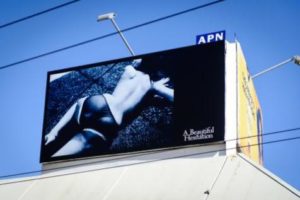
City Gallery billboard
In 2015, the City Gallery placed this image, Gigi on their floor and on a Courtenay Place billboard. Regardless of her talent as a fine art photographer, the reproduction of pornography is one of Fiona Pardington’s major claims to fame. Local producer, beat-maker and musical powerhouse Estère just released an album in which the title track, Ambition, features “Magdelaine Lavirgin, bordello resident,” who “wants to be the United States President”.
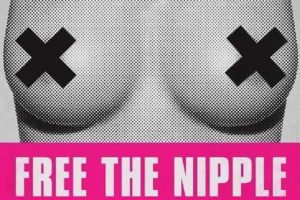
There’s a “Free the Nipple” event coming up this month (“How far will you go for equality?”), asking women to get topless on Oriental Bay for gender equality, and that follows October’s Naked Girls Reading night. Both these events are international franchises. One guy told me he likes the idea of “Free the Nipple”, because he thinks it makes “porn redundant” – places it at his doorstep. There’s no shortage of leery commentary to be found about Free the Nipple from men online. That alone should make us question whether such events really bring about social change, and challenge to male power – or whether they co-opt feminist language to keep women in our place.
Women seem to be engaging in these events as activism because we somehow believe that normalising exposure of “the nipple” will help liberate “it” because men will become so accustomed to seeing female breasts in everyday settings, that they will no longer find them arousing, and then women will finally have the same privilege as men do to go topless. One of the problems with this notion is that it rests on the same habituation principle as pornography does, and the trajectory does not lead to liberation. What happens instead is that men are habituated and desensitised to the point of boredom, and then the game is lifted. In pornography, that means more explicit degradation and violence. Men did not used to like watching a woman being anally raped until she suffers rectal prolapse: they do now. It’s called “rosebudding”, and it’s the new trend.
The point is, that as long as power is still in men’s hands, and men are still buying women, using pornography, broadcasting misogyny, and capitalising from it all, while controlling every position and institution of influence there is – the habituation principle doesn’t work in women’s favour. If we are not taking power away, but we are taking more clothes off in more places, we are succumbing to the demands of men. If we are forcing or coercing other women to accept this status quo, we’re doing the patriarchy’s work for it, gratis.
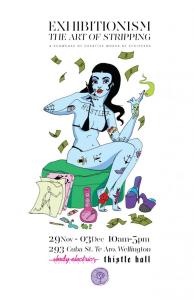
The Art of Stripping is an exhibition that recently showed at Thistle Hall, offering nipple plaster castings. The exhibition showed art by women who strip in Wellington strip clubs, claiming to demonstrate how “women involved in sex work are all unique and complex people”, though the show was still geared toward ultimately leveraging women’s creativity to legitimise the sex trade. Free trial pole dance classes and burlesque shows are never lacking in Wellington, which normalise that trade too; then of course there’s the usual barrage of objectifying advertising and media, that all these “feminist” activities still insist on distinguishing themselves from. They’re meant to be more sophisticated, avant-garde, political and literary than low-brow mainstream objectification.

Naked Girls Reading, an international campaign. Photo: Facebook event page
Estère’s Ambition music video, featuring Magdelaine Lavirgin (“bordello resident”) presents a telling commentary. Estère’s music has a rebellious, politicised, independent spirit. I Spy, for instance is a song about child poverty, inequality and the 1% caricatured through Baba Yaga imagery. To understand Estère’s punch is to know too that she can shake the world up from home in her pyjamas if she wants to: she makes music with a portable Music Production Centre called Lola, recording the slamming, for instance, of a cutlery drawer; the banging of a drumstick against a lampshade. Her search for rousing sound in her surrounds reminds me of the music company Stomp – except she is one woman.

Ambition presents Lavirgin as strident, not downtrodden. According to a meme Estère has made, “Emancipation of the afro” is one of Lavirgin’s campaigning platforms – she whips a blonde wig off at the video’s opening to liberate her afro by the end of the song, in a profound gesture of black liberation. Estère’s presence, spunk, creative integrity and production talent is jaw-dropping.
Estère’s Lavirgin is not a prostituted woman. She’s the “empowered sex worker” of liberal feminist mythology. She struts in a red cocktail dress pursued by figures in suits with cameras for heads that shine their lights on her. Presumably these camera-headed suits are pornographers, or perhaps they stand more abstractly for the male gaze; Lavirgin in any case, barely pays them notice. She’s just too sassy.

These pursuers eventually tear off their headgear and suits to reveal themselves as a group of women who then hoist up Lavirgin like a prize, decorate her with jewellery and fan her with star-spangled American flags in her presidential chair. To me, this video is a portrait and snapshot of the state of feminism in Wellington; the song a rather cutting anthem. It’s a depiction of the liberal feminists of Wellington and their downright worship of sex trade lobby spokespeople. The video contains vital motifs and messages about black liberation. Yet parallel to that, it tells a story of women, consciously or not, doing the patriarchy’s work for it: the promotion of pornography, and legitimising of prostitution.

It is possible to examine what really happens when a woman sex trade lobbyist – someone with vested interests in promoting the idea of “sex work” as “empowered” – gains access to the highest halls of power. It is not good news for women. Kat Banyard’s book Pimp State discusses how Alejandra Gil, a convicted sex trafficker, managed to lobby the U.N. and Amnesty International into developing policy of benefit to pimps and traffickers such as herself. She’d had a fifteen-year prison sentence for trafficking women and girls; it’s not hard to see why she’d want the sex trade legitimated. It doesn’t help the girls and women who are trafficked and prostituted; neither does our mainstreaming of this kind of lobbying.
Radio New Zealand seems in on this too. The Wireless published an article this year, about how “stigma” causes violence in prostitution (not pimps or johns), and RNZ did a terrible podcast on prostitution that was more like a lobby-produced advertorial.

It is worth considering too, that when Eleanor Catton (another magnificent creative and heroine of mine) won the Booker Prize, she did so for writing an 832-page novel in which the central protagonist is a prostituted woman, but rape is barely mentioned and prostitution hardly problematised.
I know that I will get in trouble with sisters for writing this; I’ll be accused of attacking women. I still think we need to be talking about the trends that might be keeping us “in our place”, keeping us immobile and unthreatening, while we enter a Trump-era of escalating violence, exploitation, attacks on reproductive rights, mass manipulation and hostility toward women.
With regard to that manipulation – consider that businessmen-pornographers have been grooming the market to make porn socially acceptable in the interests of capital gain since the 1950s. The first years of Hugh Hefner’s Playboy, Bob Guccione’s Penthouse and Larry Flynt’s Hustleron the shelves saw these pornographers work hard to normalise porn. By the 90s, bunny merchandise was being consumed by women everywhere – the bunny branding everything from stationery to pyjama pants.
“It was a very different world,” says feminist writer Gail Dines, “after Hefner eroded the cultural, economic, and legal barriers to mass production and distribution of porn.” It is now even considered up for debate now whether pole dancing is the best after school activity for 8-year-olds.
How did this shift to the mainstream happen? The answer is simple: by design. What we see today is the result of years of careful strategising and marketing by the porn industry to sanitise its products… reconstructing porn as fun, edgy, chic, sexy, and hot. The more sanitised the industry became, the more it seeped into the pop culture and into our collective consciousness.
Free the Nipple, Naked Girls Reading – these are global franchises, they are not grassroots community events. Where this pressure and facilitation and support comes from to run them, we need to understand. We need to understand that this is part of the normalisation of pornography, prostitution and porn culture, which are absolutely and inextricably intertwined with male capital gain, male entitlement, rape culture, sexual violence and the notion of women as property. That notion is shared by conservatives and liberals alike. Both these political groups are male dominated. Both have ways of capturing and co-opting of feminist language and ideals to keep women “in our place”.
Radical feminist midwife MaryLou Singleton sums it up beautifully. “There is liberal patriarchy and there is conservative patriarchy,” she says,
but I agree with Sunsara Taylor, the founder of Stop Patriarchy, that between the pope and the pimp there is really no fundamental difference. But right now, our options are being set up so that you can either align with the ‘Pope Lobby’ or the ‘Pimp Lobby’.
This manipulation and recruiting of women into sex-trade promotion through liberal politics has been successful to the point that porn and sex are now for all intents and purposes, synonymous. As Dines states, if you are anti-porn, you get slapped with the label “anti-sex”. This shows to what extent women have had the wool pulled over our eyes. Our sexuality istheir industry.
I have a fantasy of my own: of women rejecting that colonisation of our bodies and sexuality. Of women no longer pulling punches. What if Estère’s powerful contribution to black liberation struggle was combined with a rejection of prostitution as a tool of women’s subordination? What if Lola really held the power to boot the Chow brothers – known abusers who capitalise from exploitation of women in Wellington – out of town? I think she does hold that power.
What if Hera Lindsay Bird used her stir-up, startle-power to expose anti-feminism in the literary world? What if Fiona Pardington photographed johns and pimps and brought their abuse to light in chiaroscuro, instead of re-photographing already exploited women? If Eleanor Catton, after being called an “ungrateful hua” on air, called for a cull of commercial radio misogynists? If Hadassah Grace used her writing talent, slam voice and powers of intimidation to get White Ribbon ambassadors to check their phallocentric campaigning, re-open Christchurch’s Rape Crisis centre, provide some actual analysis, and perhaps support free self defence for women?
What if Free the Nipple was a women’s gathering, like the consciousness-raising, political gatherings of the 1970s? Like, if we all got bullied, banned and censored for talking sexual politics alone (fuck that)… what if we organised?


by DGR Editor | Sep 2, 2015 | Gender, Rape Culture
by Derrick Jensen / Deep Green Resistance
The man box is full of proof. Except that there is no man box, the man box can never be filled, and real men don’t need proof.
Let’s start with Abraham and Isaac. You know the story. God tells Abraham to slit his child’s throat. Abraham ties up his son, raises the knife, and at the last moment God says it was a test. End of story. Lesson? Abraham shows, by his willingness to violate his child, the proof of his worth. And Isaac learns that his father was willing to kill him rather than act against the cult of masculinity, against the rules of the man box.
There are many rules of the man box, even though there is no man box, and there are no rules. Why call it a box when it’s the way things are? And why call it a rule when it’s who you are?
Rule 1: There is no man box.
Rule 2: There is no box but the man box, and thou shalt have no other boxes before it.
Rule 3: That’s the way things are.
Rule 4: That’s who you are.
So I’m in a restaurant, and I overhear one guy say to another that he’s in pain. The other responds, “Suck it up. When are you going to quit being such a woman?”
So yes, I understand that men are taught to not feel. Yes, I understand that the cult of masculinity is all about not feeling. I understand that must be hard. But honestly, I don’t give a shit about understanding the emotional state of members of the cult of masculinity, except insofar as that understanding might help stop them. It’s a bit late in the game to be worried about the feelings of perpetrators.
The ones I care about are their victims, because the man box isn’t about putting men in a box, it’s about putting everyone else in a box, the box of other, of less than, of trophies, the box of the violable, the box of targets, the box of victims, the box of the violated, the box of proof of the men’s own manhood.
Have you ever done the math on how many women who are alive right now have been raped? There are almost seven billion people on the planet, so there are about 3.5 billion women. About one in four women is raped in her lifetime, and another one in five fend off rape attempts. So more than 800 million women living today will be raped in their lifetimes. Let’s say half of those have not yet been raped. So 400 million women living now have been raped.
And another now.
And another now.
This also means, among many other things, that unless a few men are excruciatingly busy, there are a lot of rapists out there, a lot of members of the cult of masculinity, a lot of men who adhere to the rules of the man box.
But you already knew that.
But of course there is no man box, and there can be no man box, because if there were a man box, that would mean there’s something outside the man box, and there’s nothing outside the man box because there can be nothing outside the man box, and there can be nothing outside the man box because there must be nothing outside the man box.
Because if there were, well, there isn’t, and can’t be, and mustn’t be.
Because if there were, that would mean members of the cult of masculinity aren’t as omnipotent—as completely potent—as they must be. And also because if there were, why would any victims put up with this shit?
So there must not be a man box, because everything is part of the man box.
That is, everything is violable. And everything must be violated.
Rule 5, which is actually Rule 1, which is actually the only rule there is: I exist only insofar as I violate you.
But of course rule 5 does not exist. Nor does rule 1.
The other day I saw an astronomer saying why he thought it was important to explore Mars and other planets: “It will,” he said, “answer that most important question of all: Are we all alone?”
I have an even more important question: is he fucking crazy?
No, just a member of the cult of masculinity.
Did you know that 200 years ago there were flocks of passenger pigeons so large they darkened the sky for days at a time? And flocks of Eskimo curlews so thick that ten, fifteen, twenty birds would fall to a single shot? There were so many whales in the North Atlantic they were a hazard to shipping, and there were runs of salmon so thick they would keep you awake all night with the slapping of their tails against the water. And he asks if we are alone?
Only if you’re a member of the cult of masculinity, in which case you are of course alone, with other members of your cult, because you have declared yourself to be the only one who matters, the one who does to as opposed to everyone else, to whom it is done.
Did you know that this culture is driving two hundred species extinct each and every day? Did you know that stolid scientists are saying the oceans could be devoid of fish in fifty years?
And do you know why?
And did you know that the world used to be filled with thousands of vibrant human cultures? And that human cultures are being driven extinct at an even faster relative rate than nonhuman species?
And do you know why?
The man box is full of women. It is full of passenger pigeons. It is full of whales. It is full of indigenous humans. The man box is full of the entire world.
But the man box isn’t full, because the man box—which does not exist—can never be full.
The psychiatrist R.D. Laing famously asked, “How do you plug a void plugging a void?”
That’s the question, isn’t it?
But of course it isn’t the question because men don’t have a void, and if they did have a void they certainly wouldn’t plug it with a void.
Someone once told me that any hatred—or maybe any void—felt long enough no longer feels like hatred, but rather like religion, or economics, or science, or tradition, or just the way things are.
With all the world at stake I need to speak plainly. The problem is that within this patriarchy, identity itself is based on violation. Violation becomes not merely an action but an identity: who you are, and how you and society define who you are. Within this patriarchy men’s masculinity defines itself by identifying others—any and all others—as inferior (which is why those stupid fucking scientists can ask “Are we all alone?” as they destroy the extraordinary life on this planet), and as being therefore violable, and then violating them. For men under this patriarchy, these acts of violating others are how we become who we are. They validate who we are. They then reaffirm who we are, as through these repeated acts of violation we come to perceive each new violation as reinforcement not only of our superiority over this other we violated but as simply the way things are.
So without this identification of others as inferior, without this violation, we are not. We are a void. And so we must fill this void, fill it with validations of our superiority, fill it with violations. Thus the rapes. Thus the violation of every boundary set up by every indigenous culture. Thus the extinctions. Thus the insane belief in an economic system based on infinite growth despite the fact that we live on a finite planet. Thus the refusal to accept any limits on technological progress—more properly termed technological escalation, as it really involves an escalation of the wielders’ ability to control and violate at a distance—or on scientific “knowledge.” Thus the sending of probes to penetrate the deepest folds of the ocean floor. Thus the bombing of the moon.
What makes this problem even worse is that because there are always those who have yet to be violated, and because this violation isn’t really solving the needs it purports to meet—it’s a void plugging a void—this drive to violate is insatiable.
This culture will continue to violate, until there is nothing left to violate, nothing left.
So what is at stake in this whole discussion is life on this planet. This cult of masculinity must not merely be left, and must not merely be exposed. It must be destroyed, or it will continue to violate its way to the end of all that is alive.
But before we can leave this cult we must understand that it is not all that is. That there is a cult of masculinity, and there is a man box, and you can leave them both. Burn this into your heart: this imperative to violate is not natural. It is cultural.
And we must resist every effort by the abusers, by the violators, to “naturalize” this drive to violate. For this is what abusers, violators, must do. They must attempt to convince themselves and everyone else that their way is the only way, that there is no other way. They must convince themselves and everyone else that not only is there nowhere outside the cult of masculinity, nowhere outside the man box, but indeed there exists neither a cult of masculinity nor a man box.
There is only this one way of life, which is not just a way of life because it encompasses all that is or ever was or ever will be. It is everything.
They say.
But they are lying, to themselves and to you. Even if they have an entire culture to back them up, they are still lying.
We must never forget that. There is a cult of masculinity, and there is a man box, and we can leave them. We can not only leave them. We can destroy them. We must. With all the world at stake, we must.
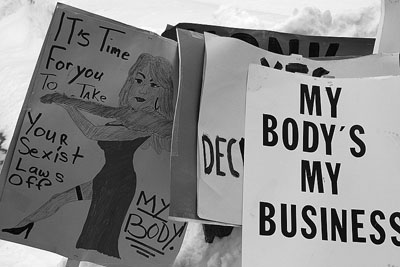
by Deep Green Resistance News Service | May 22, 2013 | Prostitution
By Taryn Fivek
This article has been republished with permission from the author. Permission to republish does not necessarily imply endorsement of any positions made by DGR.
What is postfeminism? Allegedly it is the space where we can move past feminism, where feminism no longer holds appeal to women and where it can even be harmful to women. As Melissa Gira Grant writes:
The patriarchy’s figured out a way to outsource hatred of prostitution. They’re just going to have women do it for them.
Grant, who is a former sex worker (to be specific: not a pimp/madam) claims that patriarchy, an amorphous “they” not rooted in material reality, has outsourced the oppression of women to women themselves. This is an argument made by many who claim that women are the ones who cut other women in other parts of the world, who participate in forcing early marriage or abuse other women in the family. Then Grant gets more specific:
I wouldn’t advocate for a feminism that’s buttoned-up and divorced of the messiness of our real lives. Your feelings are your feelings, but you’re not going to litigate your feelings about my body. The feminist ethics that I signed up for were respect for my bodily autonomy, that my experience is my experience, and that I’m an expert in my own life.
What is postfeminism? It is a desire for control over one’s destiny. It is the hope that someday, no one will call you any names or discriminate against you based on your sex. Yet, when this individual oppression ends – the oppression against prostitutes, against trans women, against my right to choose, against me, will this have achieved female liberation?
The postfeminism of today is deeply rooted in neoliberal atomization. A single female’s experiences are just as valid as any other female’s experience. A wealthy white woman who “makes the choice” to become a prostitute – her choice is equally valid as the poor woman of color who “makes the choice” to become a prostitute. Postfeminism promises the liberation of individual women, but not females. These individuals are fighting against “patriarchy”, a concept that is not individualized or even rooted in material manifestations. Rather, it is as amorphous as its own concept: a male slapping a woman, a man cat-calling a woman, or a man who makes a sexist remark at work is patriarchy rearing its ugly head from the aether. Yet a culture of objectification, where women are plastered up like slabs of meat for sale in phone booths, where women dance for money, where women continue to make $.70 on the dollar; this is not considered a war against women. After all – a woman may now make the individual “choice” to engage in these acts, in these careers, may make the individual “choice” not to bear children to get ahead in business. Acts of violence against my body are crimes against women – but larger systems of oppression suddenly become more complex, more bogged down in uncertainty as we must learn to understand that these systems are made up of individuals who have the capacity to make “choices”.
It astounds me that leftists who might otherwise deride the idea of free choice under a capitalist system make all sorts of room for women like Grant to write privileged accounts of the system of oppression called the “sex trade”. Broader women’s movements such as the Aboriginal Women’s Action Network might feel as though an abolitionist stance on prostitution is right and good, but, as Grant would say, they are “privileged” in that their voices are louder than hers – the voice that enjoys prostitution believes that sex work is feminist work. Indeed, the other voices aren’t heard as loudly as the abolitionists “because they’re working”. This amorphous group of women who are pleased as punch to be working as sexual objects for sale are quiet, a silent majority cowed into silence by angry groups of feminist women who claim that 90% of women want out of prostitution.
If the voice of a “queer woman who dates women in her non-sex-work life and has sex with men for work” is not heard as much as the loud majority of feminists who want an end to prostitution, this is because women who “choose” sex work, who come at it from a political perspective of “empowerment” are in the extreme minority. But the individual reigns supreme over the masses in postfeminism just as it does in neoliberalism. When a woman demands her “right to choose”, she is demanding her right. She is situating feminism in a sphere where she does not feel fettered by her sex, where she personally has the ability to pursue whatever she wants. If she is a stripper and a man touches her inappropriately, this is a battle in the war against male domination – but the very institution that shapes his thinking is not in and of itself oppressive. Male domination is boiled down to the individual, becomes a question of one human exerting his will over another’s in an unfair way. It is no longer about systems of oppression, cultures of abuse, or industries of suffering. We are boiled down once again to our individual experiences.
A single person cannot change the world because change is the prerogative of the people. There is no such thing as a mass movement of individuals – they might all be walking in the same direction, but they are checking their smartphones and turning off onto a side street the moment they are required to check their egos at the door.
Melissa Gira Grant’s views are not just dangerous because they blame women themselves for their own oppression – either as angry sex-negative feminists or individuals who just make “bad choices”. They are dangerous because they shift the blame away from male violence and domination and continue to trump the experiences of a privileged few over the many. Why won’t these leftist blogs and magazines run a counter article to this kind of perspective? Anything else would be hypocritical. Perhaps it is simply not what leftist men want to hear: that their individual enjoyment is not the purpose of female liberation.
From Manyfesto:
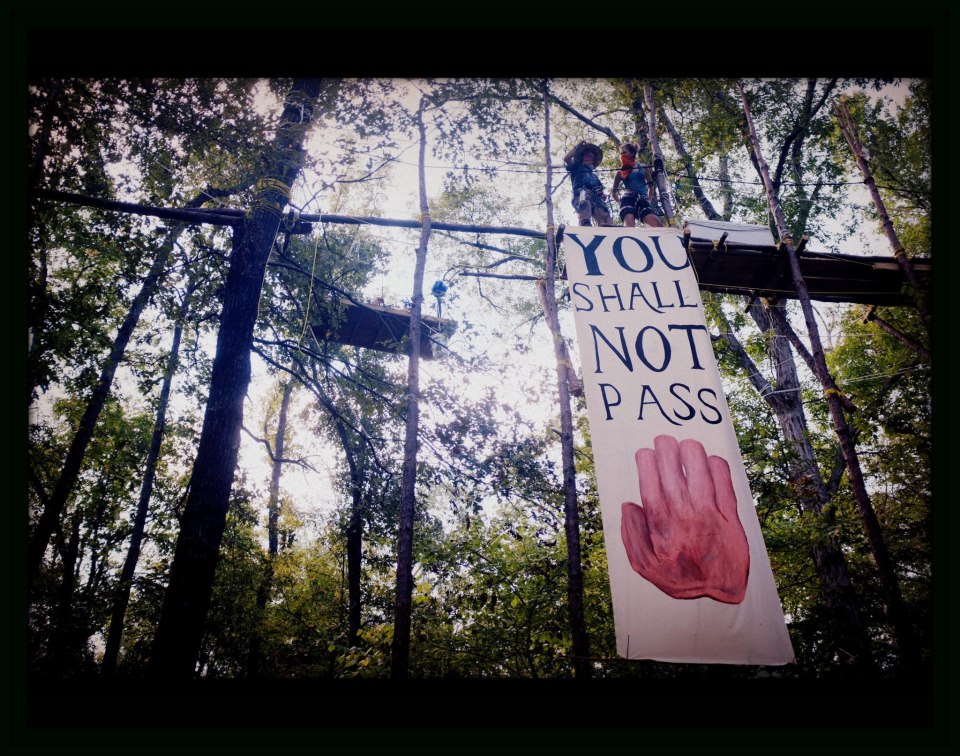
by Deep Green Resistance News Service | Oct 16, 2012 | Obstruction & Occupation
By Candice Bernd / TruthOut
More than 50 blockaders tried to re-enter the site of what has become a historic standoff Monday, to expand and support the ongoing Tar Sands Blockade tree village in east Texas.
Several managed to break through police lines to attempt to re-supply activists who have been occupying trees in the pathway of the Keystone XL pipeline since September 24. The rest of the blockaders rallied nearby, blocked by police and TransCanada’s hired security, who have formed a human barrier around the pipeline easement.
Two blockaders have locked themselves to construction equipment, and six blockaders have been arrested so far today.
Blockaders have been trying to negotiate with security hired by TransCanada to get food and water to activists occupying the trees in the path of the Keystone XL pipeline, to no avail. Now they are taking a stand together to get supplies to the activists occupying the tree-sit so they may maintain their standoff.
The activists were gathered at the location in Winnsboro after spending the weekend at a direct-action camp hosted by Tar Sands Blockade. Activists traveled from across the country and were trained in climbing, media relations, organizing and body blockade techniques.
“Coming out here had been one of the more inspiring things that I have done in years now,” says Toby Potter, a member of the environmental organization, Earth First!
Potter helped lead workshops over the weekend for camp participants in lockdowns and body blockades. “It gives me a lot of hope, seeing all this resistance from the area … and from around the country, and knowing that there’s [sic] other fights against tar sands at the same time.”
Potter helped camp participants erect a 30-foot wooden tripod used by activists who sit at the top of it during a blockade action. Many of the weekend’s campers participated in Monday’s blockade in Winnsboro to defend the tree village.
TransCanada filed a Strategic Lawsuit Against Public Participation (SLAPP) last week, naming 19 individual defendants, three organizations, and another six unidentified tree-sitters. The broad civil action seeks an injunction, declaratory relief and damages.
Most of the defendants have been arrested in previous Tar Sands Blockade actions. Ron Seifert, the Blockade’s media spokesman, was also named, although he has not yet been arrested in connection with the ongoing protest. Actor Daryl Hannah, who was arrested while defending Area Landowner Eleanor Fairchild’s home, is not named in the SLAPP suit. Fairchild, however, is named in the suit.
Another activist, going by the name Kevin Redding due to security concerns, recently escaped arrest at a secondary tree-sit the Blockade launched last week at West End Nature Preserve outside Mt. Vernon, Texas, where TransCanada had announced plans to cut trees.
“I’ve lived in Texas my whole life, and when I heard about TransCanada putting the pipeline through, I didn’t like the idea of any part of Texas having a tar sands pipeline going through it,” Redding told Truthout. “I’ve been here for a long time, and I don’t plan on going anywhere.”
Redding said local police tried to intimidate him, as he sat in a tree, with threats that he would be charged with terrorism. When company representatives said they would under-bore through the preserve, rather than cut trees in the ecologically sensitive area, the activist left the site, unobserved.
Monday’s action comes on the heels of an ongoing police crackdown not only on the tree-sitters, but also on journalists trying to tell their story. Two New York Times reporters were detained Oct. 10 while covering the tree-sit. They were released after identifying themselves as media.
Read more from TruthOut: http://truth-out.org/news/item/12121-fresh-recruits-more-arrests-begin-week-four-in-texas-tar-sands-blockade

















